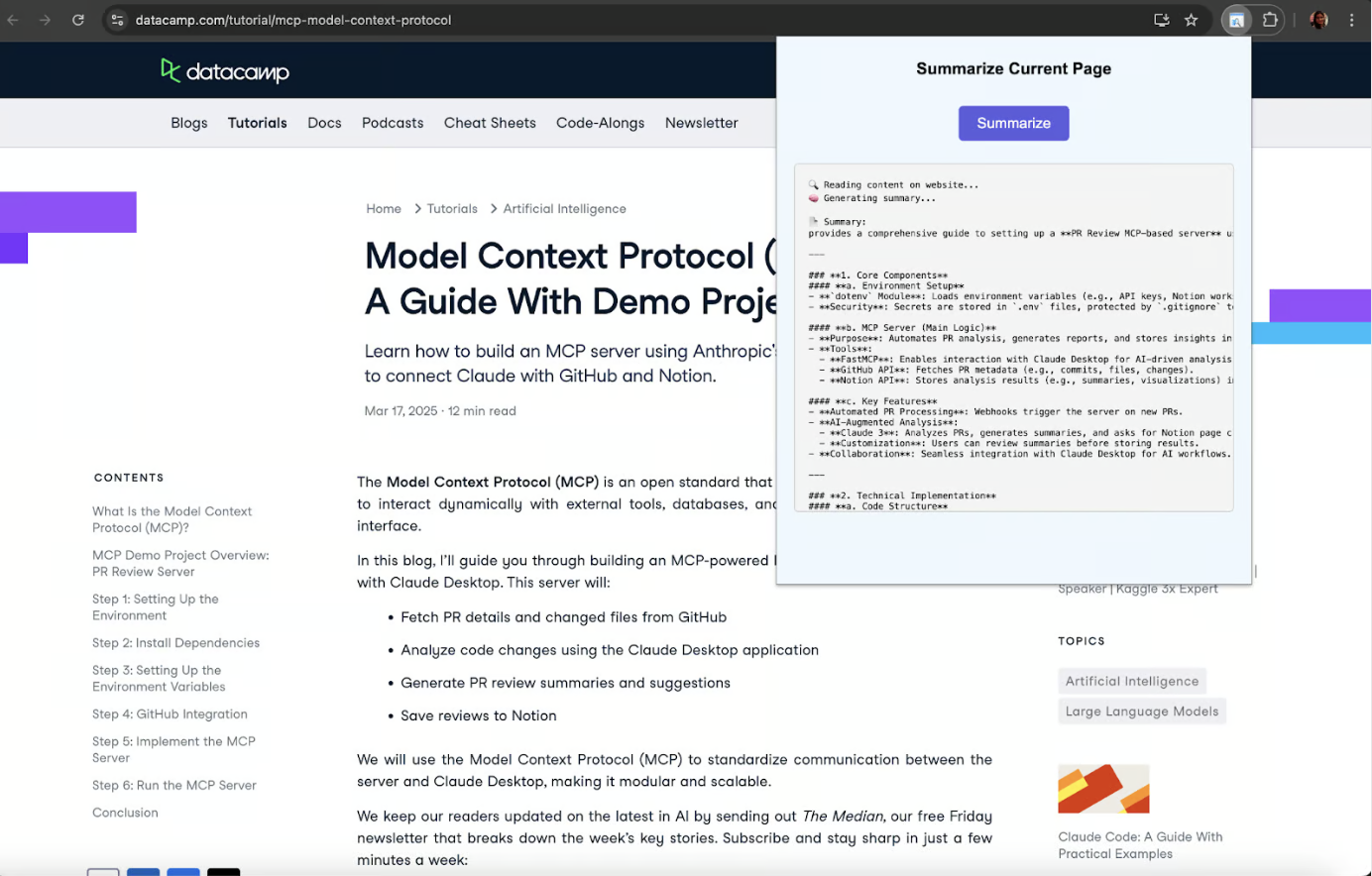Read the full article on DataCamp: Qwen-Agent – A Guide With Demo Project
In this tutorial, you’ll learn how to build a real-time browser extension that summarizes any webpage using Qwen-Agent and Qwen3, all running locally with Ollama. No cloud APIs needed.
🔍 What Is Qwen-Agent?
Qwen-Agent is Alibaba’s lightweight agent framework for building powerful LLM applications using Qwen3 models. Key features include:
- Tool/function calling (e.g., code interpreter)
- Multi-turn planning and memory
- Streaming support
- Local and API-based model backends
You can combine it with FastAPI and Ollama to build offline, modular, and fast agents.
⚙️ Project Overview: Real-Time Summarizer
We’ll build a browser extension that:
- Extracts visible text from any webpage
- Sends it to a FastAPI backend powered by Qwen3
- Streams a clean summary back into the popup UI
Tech Stack
- Backend: Qwen-Agent + FastAPI + Ollama (Qwen3:1.7B)
- Frontend: Chrome Extension (manifest v3)
- Streaming UI: JavaScript with
ReadableStream
🚀 Step 1: Backend Setup
1.1 Dependencies
Create requirements.txt:
fastapi
uvicorn
python-dateutil
python-dotenv
qwen-agent[code_interpreter]
matplotlib
Install:
pip install -r requirements.txt
1.2 (Optional) Dockerfile
FROM python:3.10
WORKDIR /app
COPY . .
RUN pip install --no-cache-dir -r requirements.txt
EXPOSE 7864
CMD ["uvicorn", "app:app", "--host", "0.0.0.0", "--port", "7864"]
1.3 Run Qwen3 with Ollama
ollama pull qwen3:1.7b
ollama serve
1.4 FastAPI Server with Streaming
Example app.py:
from fastapi import FastAPI, Request
from fastapi.responses import StreamingResponse
from pydantic import BaseModel
from qwen_agent.agents import Assistant
import re
app = FastAPI()
class RequestData(BaseModel):
content: str
bot = Assistant(
llm={"model": "qwen3:1.7b", "model_server": "http://localhost:11434/v1", "api_key": "EMPTY"},
function_list=["code_interpreter"],
system_message="You are a summarization assistant. Output only a clean final summary."
)
@app.post("/summarize_stream_status")
async def summarize_stream_status(data: RequestData):
user_input = data.content
def stream():
yield "🔍 Reading content...
"
messages = [
{"role": "system", "content": bot.system_message},
{"role": "user", "content": f"<nothink>
Summarize this:
{user_input}
</nothink>"}
]
yield "🧠 Generating summary...
"
result = bot.run(messages)
result_list = list(result)
summary = None
for item in reversed(result_list):
if isinstance(item, list):
for sub in reversed(item):
if isinstance(sub, dict) and "content" in sub:
summary = sub["content"]
break
if summary:
break
summary = re.sub(r"</?think>", "", summary or "").strip()
yield f"
📄 Summary:
{summary}
"
return StreamingResponse(stream(), media_type="text/plain")
🧩 Step 2: Chrome Extension
Folder structure:
extension/
├── background.js
├── content.js
├── icon.png
├── manifest.json
├── popup.html
└── popup.js
2.1 manifest.json
{
"manifest_version": 3,
"name": "Web Summarizer",
"version": "1.0",
"description": "Summarize webpage content using local Qwen3.",
"permissions": ["scripting", "activeTab", "storage"],
"host_permissions": ["<all_urls>"],
"action": {
"default_popup": "popup.html",
"default_icon": "icon.png"
},
"background": {
"service_worker": "background.js"
},
"content_scripts": [
{
"matches": ["<all_urls>"],
"js": ["content.js"]
}
]
}
2.2 popup.html
<!DOCTYPE html>
<html>
<head><meta charset="UTF-8"><title>Web Summarizer</title></head>
<body>
<h2>Summarize This Page</h2>
<button id="summarizeBtn">Summarize</button>
<pre id="output">Summary will appear here...</pre>
<script src="popup.js"></script>
</body>
</html>
2.3 popup.js
document.getElementById('summarizeBtn').addEventListener('click', async () => {
const [tab] = await chrome.tabs.query({ active: true, currentWindow: true });
chrome.scripting.executeScript(
{
target: { tabId: tab.id },
func: () => document.body?.innerText || 'EMPTY'
},
async (results) => {
const pageText = results?.[0]?.result || '';
const res = await fetch('http://127.0.0.1:7864/summarize_stream_status', {
method: 'POST',
headers: { 'Content-Type': 'application/json' },
body: JSON.stringify({ content: pageText })
});
const reader = res.body.getReader();
const decoder = new TextDecoder();
let resultText = '';
while (true) {
const { done, value } = await reader.read();
if (done) break;
resultText += decoder.decode(value, { stream: true });
document.getElementById('output').innerText = resultText;
}
}
);
});
2.4 content.js
chrome.runtime.onMessage.addListener((request, sender, sendResponse) => {
if (request.type === "GET_PAGE_TEXT") {
sendResponse({ text: document.body.innerText.trim() || null });
}
});
🧪 Step 3: Running the App
Run FastAPI backend locally:
uvicorn app:app --host 0.0.0.0 --port 7864
Or using Docker:
docker build -t qwen-agent-backend .
docker run -p 7864:7864 qwen-agent-backend
Load the extension in Chrome via “Load Unpacked” and select the extension/ folder.
✅ Conclusion
You now have a fully offline, real-time webpage summarization extension using Qwen-Agent + Qwen3. This architecture can be adapted for:
- Document readers
- Browser copilots
- Local research agents
For more tutorials:


Comments